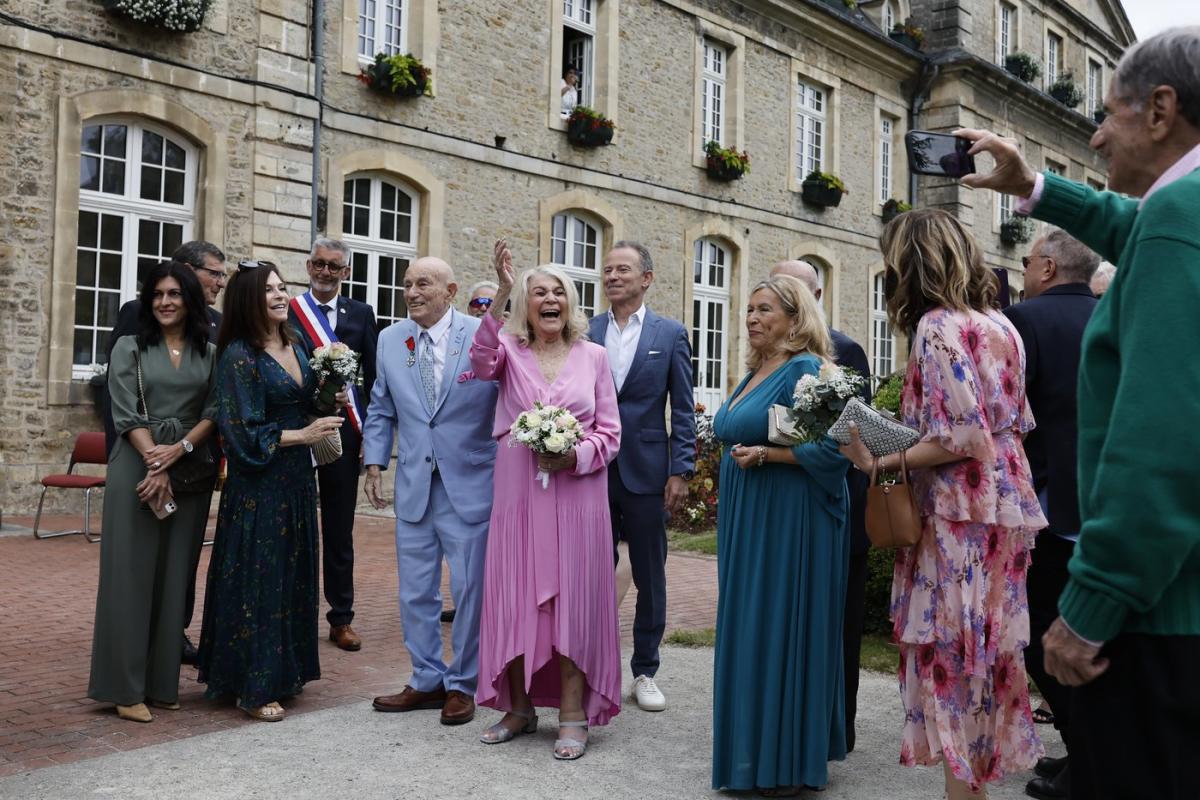A World War II veteran has just married his bride near the D-Day beaches of Normandy. He is 100, she is 96

CARENTAN-LES-MARAIS, France (AP) — Bride and groom reached nearly 200 years together, but World War II veteran Harold Terens and his sweetheart Jeanne Swerlin proved that love lasts forever when they tied the knot Saturday inland from the D-Day beaches in Normandy, France.
Because of their ages – he is 100, she is just 96 – their wedding became a celebration that lasted almost a double century.
Terens called it “the best day of my life.”
On the way to the ceremony, the bubbly bride said: “This isn’t just for young people, darling, you know? We’ve got butterflies in our stomachs. And there’s a bit of action too.”
The setting was the elegant stone town hall of Carentan, a key first D-Day objective where fierce fighting took place following the Allied landings on June 6, 1944, which helped liberate Europe from Adolf Hitler’s tyranny.
Like other towns and villages along the Normandy coast, where nearly 160,000 Allied soldiers disembarked under fire on five code-named beaches, the site is a lively centre of commemoration and celebration to mark the 80th anniversary of the deeds and sacrifices of the young men and women who made that day. It is decorated with flags and pennants and the veterans are celebrated like rock stars.
While the swing of Glenn Miller and other contemporary tunes resounded through the streets, well-wishers – some of them dressed in World War II clothing – had already lined up behind barriers in front of the town hall a good hour before the wedding. A rousing bagpipe and drum band was also on hand to serenade the happy couple.
After both had answered their wedding vows, which the mayor of Carentan read out in English, with “oui”, the couple exchanged rings.
“With this ring I marry you,” said Terens.
She giggled and gasped, “Really?”
With champagne glasses in their hands, they waved through an open window to the admiring crowd outside.
“To the health of all. And to peace in the world and the preservation of democracy everywhere and the end of the war in Ukraine and the Gaza Strip,” said Terens as he and his bride clinked glasses and drank.
The crowd chanted “la mariée!” – the bride! – to Swerlin, who wore a long, flowing dress in bright pink. Terens looked dapper in his light blue suit and matching pink headscarf tucked into his breast pocket.
And they enjoyed a wedding night party of a special kind: They were invited to the state dinner at the Élysée Palace on Saturday evening together with President Emmanuel Macron and US President Joe Biden.
“Congratulations to the newlyweds,” Macron said, drawing cheers and a standing ovation from other guests during the toast to Franco-American friendship. “(The city of) Carentan was happy to host your wedding and we your wedding dinner,” he told the couple.
The wedding was symbolic and not legally binding. Mayor Jean-Pierre Lhonneur’s office said he was not authorized to marry foreigners who do not live in Carentan and the couple, both Americans, had not requested legally binding marriage vows. However, they could always complete those formalities in Florida if they wished.
Lhonneur likes to say that Normandy is effectively the 51st state of the United States, given the reverence and gratitude shown to the Allied soldiers and the sacrifices of the tens of thousands who never returned home from the Battle of Normandy.
“Love is eternal, yes, perhaps,” the mayor said of the newlywed couple, although his remarks also aptly describe the feelings of many Normans toward veterans.
“I wish them the best of happiness together.”
Wearing a 1940s dress that belonged to her mother Louise and a red beret, 73-year-old Jane Ollier was among the spectators waiting to catch a glimpse of the lovebirds. The couple, both widowed, grew up in New York City: she in Brooklyn, he in the Bronx.
“It’s so touching to get married at this age,” Ollier said. “If it can bring them happiness in the last years of their lives, that’s fantastic.”
The World War II veteran first visited France as a 20-year-old corporal in the U.S. Army Air Forces shortly after D-Day. Terens joined the Army in 1942 and, after shipping to Britain, was assigned to a four-pilot P-47 Thunderbolt fighter unit as a radio repair technician.
On D-Day, Terens helped repair planes returning from France so they could return to battle. He said half of his company’s pilots died that day. Terens himself went to France 12 days later and helped transport freshly captured Germans and newly released American prisoners of war to England. After the Nazi surrender in May 1945, Terens again helped transport released Allied prisoners to England before returning to the United States a month later.
Swerlin made it more than clear that her new, 100-year-old husband is not lacking in energy.
“He’s the best kisser ever, you know?” she declared proudly before they enthusiastically embraced in front of the television cameras.
“All right! That’s it for now!” said Terens as he surfaced for air.
To which she quickly joked: “You mean there will be more later?”
___
AP journalists Sylvie Corbet in Paris and Terry Spencer in Fort Lauderdale contributed to this report.
___
For more AP coverage of the 80th anniversary of D-Day, visit https://apnews.com/live/d-day-80th-anniversary-updates.
John Leicester, Associated Press



